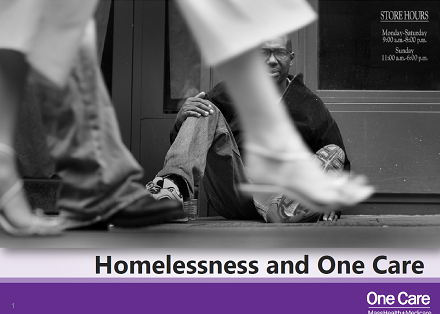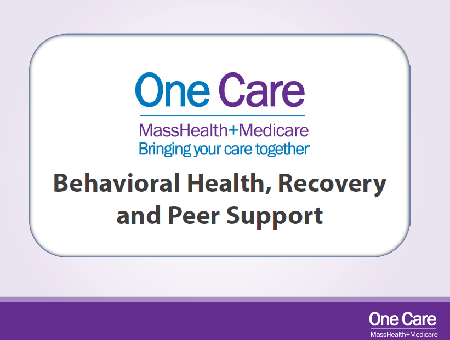Benefits Coordination
Take these online trainings on facilitating access to covered services, flexible benefits, behavioral health, community services, peers, dental care, and housing.
Finding the Right Fit in Assistive Technology (AT)
Assistive Technology (AT) ranges from low-tech options like adaptive utensils to very high-tech smart home technology and includes anything that supports individuals in becoming more independent to achieve their goals in work, school, or their daily lives. During this video care coordinators can explore different types of assistive technology; and think about how to better help One Care enrollees navigate, identify and obtain AT from resources such as the Assistive Technology Regional Centers in MA.
The Role of Peers in One Care
Evidence shows that peer services can improve self-reliance, support recovery and resiliency, and increase abilities to access services and opportunities in the community. During this webinar we’ll explore the use of peers to improve the health outcomes for One Care enrollees and how care coordinators, care managers, LTS coordinators, and providers can make the connection to peer services. Presenters will discuss peer services available from Community Health Workers, Independent Living Centers, and Recovery Learning Communities.

Promoting Wellness for People with Disabilities
Recorded 03/27/2014
This webinar discusses challenges and strategies for promoting wellness among people with disabilities. It also explores how One Care services can help support efforts to achieve wellness.

Discussing the Housing Landscape
Recorded 03/11/2020
Stable housing is essential for better health, but navigating this terrain can be daunting. Care Coordinators, LTS coordinators, and other professionals who are familiar with affordable housing options will be better equipped to support MassHealth members who are facing homelessness or who are in unstable housing.

Working with Individuals with Housing Instability
Recorded 10/07/2020
The goal of this webinar is to help Care Coordinators support MassHealth members with connecting to housing resources. Presenters provide insight into navigating some of the changes in housing related to COVID-19, including the temporary eviction moratorium.

Improving Oral Health Access
Recorded 3/24/21
When accessing oral health services, people with disabilities often face inadequate preparation by Providers, inaccessible buildings or equipment, and a lack of understanding of members’ diagnoses to provide quality care. This webinar discusses the role of Care Coordinators in helping members to address barriers to oral health access, which includes understanding benefits (authorization and billing process), identifying appropriate and accessible Providers, preparing both members and Providers for dental visits, and working with the dental/oral health Provider to make sure that any home care instructions and/or follow up requests are provided in writing so member/Care Coordinator can share with care team members as needed.

Enhancing Care to Homeless Individuals Through One Care
Recorded 04/02/2015
This webinar explores how to use strategies for identifying homeless individuals or those at risk of homelessness. Gain insight on issues related to homelessness when providing care consistent with your role as a Provider or plan staff and understand how to communicate the benefits of One Care for homeless individuals. Additionally, learn about resources on homelessness that can benefit Enrollees.

Connecting to Substance Use Disorder (SUD) Services and Recovery
Recorded 03/05/2019
This webinar explores the continuum of MassHealth substance use disorder (SUD) services in One Care, including newly added residential services, support navigators, and recovery coaches available to improve health and increase rates of long-term recovery among individuals with SUD. Presenters from the MassHealth Office of Behavioral Health, behavioral health directors from the One Care plans, and an individual with lived experience working in recovery coaching will all share their thoughts on improving access to and success in substance use treatment.

Behavioral Health Services, Recovery and Peer Support
Recorded 01/30/2014
Over two-thirds of individuals enrolled in One Care have a behavioral health diagnosis. This webinar provides an overview of the behavioral health services that are now available as part of One Care. It also describes how behavioral health services based upon a person-centered recovery orientation are key to the care planning process and explains the role of peer specialists as care team members. Lastly, it describes how the Department of Mental Health services can be utilized by individuals enrolled in One Care.


